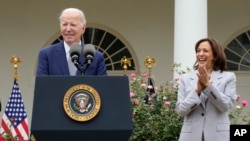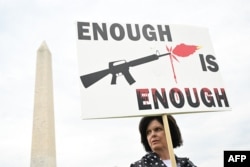Amid stalled progress on gun control legislation in the U.S. Congress, President Joe Biden announced the creation of a new federal office for gun violence prevention, tapping Vice President Kamala Harris, a former prosecutor of gun homicide cases, to lead it.
“Guns are the number one killer of children in America,” Biden said Friday during the launch event in the White House Rose Garden. “More than car accidents, more than cancer or other diseases.”
On average, more than 116 people in the U.S. die from gun violence every day, according to data from the Giffords Law Center.
The new federal office will support implementation of existing legislation and executive actions, and work with lawmakers, state officials and advocates to push for further gun violence prevention efforts.
The office, Biden said, will also coordinate more support for survivors, families and communities affected by gun violence, including mental health care and financial assistance, in the same way that the Federal Emergency Management Agency responds to natural disasters.
The National Rifle Association, a pro-gun-rights lobbying group, slammed Biden’s move as “another distraction, crafted to divert America's and the media's gaze from the Biden crime wave and their soft-on-crime policies.”
"Instead of confronting the real challenges and holding accountable the [district attorneys] who turn a blind eye to crime, this administration unfairly targets law-abiding citizens exercising their Second Amendment rights,” Randy Kozuch, director of NRA’s Institute for Legislative Action, said on social media.
Activists' support
U.S. Representative Lucy McBath, a Democratic lawmaker and advocate for stricter gun legislation, lost her son to gun violence in 2012. She said the new office would increase coordination among states and ensure proper implementation of gun safety legislation already passed in Congress.
The new office was also applauded by gun violence prevention groups, who have pressed Biden to create such an office to coordinate efforts across the federal government and to exert more leadership on the issue.
“It’s all about implementing new strategies and interventions and supporting the community-based organizations already doing great work,” said Chethan Sathya, director of Northwell Health’s Center for Gun Violence Prevention, who attended the Rose Garden event.
“From a health care perspective, we need to treat gun violence for what it is, a public health crisis,” Sathya, who is also a pediatric surgeon who has treated children who have been shot, told VOA.
Biden appointed Stefanie Feldman, his longtime gun policy adviser, to direct the office, and gun control advocates Greg Jackson and Rob Wilcox to serve as deputy directors.
Second Amendment
In general, Democrats support tighter gun laws while Republicans are concerned that such laws will infringe upon the Second Amendment of the Constitution, which protects Americans’ right to bear arms.
During Friday’s event, Harris rejected the argument that the two stances are at odds. “President Biden and I believe in the Second Amendment, but we also know common sense solutions are at hand,” she said.
Earlier this week, a group of House Republicans introduced a bill called the Protecting the Right to Keep and Bear Arms Act of 2023.
The bill would explicitly prohibit the president from declaring an emergency for the purposes of imposing gun control. It would also block government officials from prohibiting the manufacturing, sale or transfer of firearms and ammunition during a major disaster or emergency.
Illegal trafficking
It's unclear what kind of bearing the new office for gun violence prevention will have on actual policy, including the impact on neighboring Mexico, which has repeatedly asked the Biden administration to curb illegal gun trafficking. The majority of all arms used in Mexico, where gun control laws are very strict, are bought in the U.S.
White House press secretary Karine Jean-Pierre maintains that the administration’s policy on guns is “comprehensive.”
The office will have regular contact with the National Security Council and the Department of Homeland Security, Jean-Pierre told VOA during her briefing to the press Friday. “We're going to do everything that we can to combat international trafficking and smuggling as well.”
In June 2022, less than a month after 19 children and two teachers were gunned down in an elementary school shooting in Uvalde, Texas, Biden signed the most significant gun control legislation in decades, although it was more limited than what the president had sought.
The bipartisan law enhances background checks for potential gun buyers and strengthens laws against straw purchasing and trafficking of guns. It provides millions of dollars for states to implement intervention programs, such as the so-called red flag laws that allow officials to temporarily confiscate guns from people deemed in court to be too dangerous to own them.
Biden has also signed several executive actions aimed at reducing gun violence, including steps to increase the number of background checks for gun sales and to crack down on “ghost guns,” or home-assembled firearms, which are difficult to track.
On Friday, he again called for the banning of assault weapons and high-capacity magazines.







